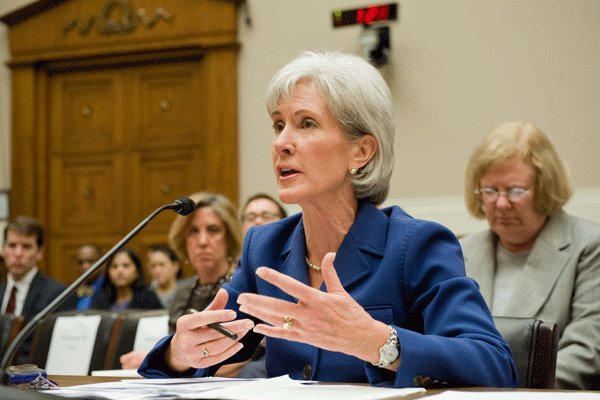
WASHINGTON (CNS) — Health and Human Services Secretary Kathleen Sebelius delivered her remarks as scheduled May 18 at Georgetown University at an awards ceremony during the university’s commencement week events.
According to The Hill newspaper, she was interrupted after she began her speech by a protester shouting something about “abortion.” The paper said the individual was escorted from the room “and continued yelling for several minutes outside.”
In her remarks at Georgetown’s Public Policy Institute ceremony, Sebelius did not mention the criticism of the university’s invitation to her to speak on campus, but the Archdiocese of Washington was among those who strongly criticized her appearance at the Catholic university because of her role in the HHS contraceptive mandate.
The nation’s Catholic bishops have repeatedly criticized the mandate, saying it threatens the religious freedom of Catholic institutions such as universities, hospitals and social service agencies because it would force them to provide employees with health insurance coverage for abortion-inducing drugs, contraceptives and sterilization procedures in violation of church teaching.
In its May 15 statement, the Washington Archdiocese noted that because of the “dramatic impact this mandate will have on Georgetown and all Catholic institutions, it is understandable that Catholics across the country would find shocking the choice of Secretary Sebelius, the architect of the mandate, to receive such special recognition at a Catholic university. It is also understandable that Catholics would view this as a challenge to the bishops.”
In a May 14 statement Georgetown’s president, John DeGioia, acknowledged concerns were “expressed by some” on the campus and in the larger American Catholic community objecting to Sebelius participating in the institute’s awards ceremony.
But he said the university had extended its invitation in early January, prior to the Obama administration’s Jan. 20 announcement about the HHS mandate.
DeGioia also said the invitation to Sebelius was not made as a challenge to the U.S. Conference of Catholic Bishops, and her presence on campus “should not be viewed as an endorsement of her views.”
As “a Catholic and Jesuit university,” Georgetown “disassociates itself from any positions that are in conflict with traditional church teachings.”
In the days leading up to Sebelius’ address, more than 27,000 people had signed a petition on the website of the Cardinal Newman Society urging DeGioia to “withdraw the invitation to Secretary Sebelius immediately.” Based in Manassas, Va., the society has as its mission “to help renew and strengthen Catholic identity in Catholic higher education.”
DeGioia in his statement said the HHS secretary had been identified by students as a potential speaker “given her role in crafting the landmark legislation that will make health care more accessible to 34 million Americans who are currently uninsured.”
He also said the university is “committed to the free exchange of ideas” and is “a community that draws inspiration from a religious tradition that provides us with an intellectual, moral and spiritual foundation.”
The Washington Archdiocese’s said it had withheld comment on the controversy until Georgetown addressed it.
In response to DeGioia’s statement, the archdiocese said the university’s president did not “address the real issue for concern — the selection of a featured speaker whose actions as a public official present the most direct challenge to religious liberty in recent history and the apparent lack of unity with and disregard for the bishops and so many others across the nation who are committed to the defense of freedom of religion.”
The archdiocese also said the “fundamental issue with the HHS mandate is not about contraception. As the United States bishops have repeatedly pointed out, the issue is religious freedom. Secretary Sebelius’ mandate defines religious ministry so narrowly that our Catholic schools and universities, hospitals and social service ministries do not qualify as ‘religious enough’ to be exempt.”
The archdiocese added that it is “especially distressing to think that the university’s Public Policy Institute would be unaware of this national debate since the mandate was published last August.”
It also said the HHS mandate’s “radical redefining of ministry should prompt Georgetown as a Catholic and Jesuit university to do more to challenge the mandate and speak up for freedom of religion.”
In March, Anna Maria College in Paxton, Mass., which is part of the Worcester Diocese, retracted its invitation to Victoria Reggie Kennedy, widow of the late Sen. Edward Kennedy, D-Mass., to speak at the Catholic college’s commencement. Worcester Bishop Robert J. McManus objected to Kennedy’s support for legalized abortion, contraception and same-sex marriage.
A petition with more than 20,000 signatures was brought to the chancery office urging the diocese to allow Kennedy to speak at the graduation.
The college has asked the bishop not to attend the May 19 commencement saying his presence would be a “distraction.” Two graduating students will give the commencement address.
Kennedy is scheduled to give the commencement address at Boston College Law School May 25.
– – –
Contributing to this story was Mark Zimmermann, editor of the Catholic Standard in Washington.






